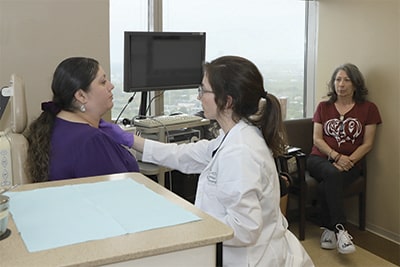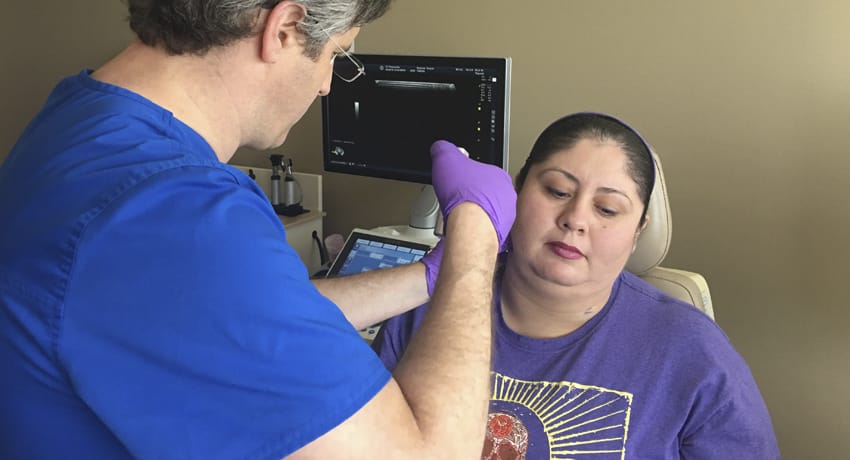“Our minds can be our worst enemy,” said Raquel Butanda. “I have been thinking about this all week.”
April 11, 2019
- Texas Medical Center 76 patients
- The Woodlands 20 patients
- Southeast Houston 30 patients
Surrounded by family, Butanda was one of nearly 130 people who checked in for the no-cost screenings offered by UT Physicians for oral, head and neck cancer on April 11, as part of Oral, Head and Neck Cancer Awareness Week. Screenings like this one support the mission of academic health care providers to educate and emphasize the importance of early interventions.
The long drive to answers
Following a six-hour drive from Laredo, Texas, Butanda was the first person seen by Ron J. Karni, MD, ENT specialist with UT Physicians and associate professor in the Department of Otorhinolaryngology – Head and Neck Surgery at McGovern Medical School.
“I saw fear in her eyes, noticed the mass on her neck—and then was deeply moved that I recognized someone in the room with her,” said Karni. “We often find that our patients are the best advocates and encourage people to be proactive when it comes to their health. I immediately recognized her aunt. She was one of my patients, a salivary gland cancer survivor, and she insisted that her niece come in to get checked out. I worked to make Raquel feel at ease and reassured her that we would take care of her.”

“You sometimes don’t want to know,” said Butanda. “I knew there was a lump, but there wasn’t any pain, so I just put it off. I had it for about three years.”
After an initial evaluation that took about 10 minutes, Karni ordered a follow-up biopsy. “I made sure she came today,” said Jacoba Guzman. “After what I went through, I know. I found mine late.”
Oral, head and neck cancers claim approximately 13,000 lives per year. If diagnosed early, these cancers can be more easily treated without significant complications, and chances of survival greatly increase.
Innovative clinical care
Butando returned to Houston on April 22 for a biopsy. Using guided ultrasound, Karni biopsied the mass. “It was a very minor pinch. I barely felt anything,” said Butanda, following the biopsy in the clinic.
UT Physicians provides state-of-the-art care that includes a biopsy in a clinical setting and the slides read remotely by pathologists with McGovern Medical School via telemedicine. It’s the only academic setting in Houston offering this type of advanced care to provide answers in a more timely manner.
Following that visit, Karni recommended surgery to remove Butando’s enlarged thyroid. Further testing determined Butando had thyroid cancer.
The thyroid is the butterfly-shaped gland located on the lower part of the neck. It helps control metabolism and is part of the endocrine system. According to the National Cancer Institute, there are more than 56,000 new cases of thyroid cancer in the U.S. each year. Females are more likely to have thyroid cancer at a ratio of 3:1. The cause of thyroid cancer is not completely understood.
“Her prognosis is very good,” said Karni. “We closely watch all of our patients and develop a bond with them and their families. We have provided reassurance and we will be with her every step of the way. If the tumor comes back, we know what to do.”
Karni leads an advanced team whose sole job is to beat oral, head and neck cancers and provide a support system for patients and their families. “From physicians to nurse practitioners, speech therapists, survivorship clinics, and more, our goal is to make cancer patients’ lives better. When I have patients bringing other people to the clinic, we know we are providing quality care that people can count on.”
Early warning signs
Every adult should be tested. Tobacco and alcohol users traditionally have been considered the populations at greatest risk for these cancers. However, throat cancer cases are on the rise in younger adults who do not smoke and recent research indicates this development is due partly to the increase of the human papillomavirus (HPV) virus. HPV-related oral, head and neck cancers are more difficult to detect because these cancers usually occur on the back of the tongue or on the tonsils, providing even more reason to get screened regularly.
The early detection of oral, head and neck cancers is crucial. The signs and symptoms often go unnoticed, but there are a few visible signs associated with these cancers such as a lump in your neck, a sore in your mouth that doesn’t heal or that increases in size, persistent pain in your mouth, lumps or white or red patches inside your mouth, difficulty chewing or swallowing or moving your tongue, soreness in your throat or feeling that something is caught in your throat, and changes in your voice.
For Butanda, the cancer has been removed. “I was surprised when Dr. Karni told me it was cancer,” she said. “But, I was also relieved because he had just taken all of it out.”
Karni’s team will now continue to monitor Butanda. He noted the importance Butanda’s family played in supporting her. “Family means something to different to everyone. When you are sick, it means the world,” said Karni. “They were there for her from day one.”



